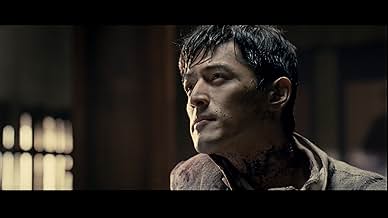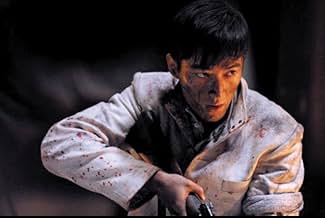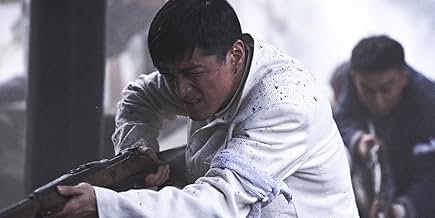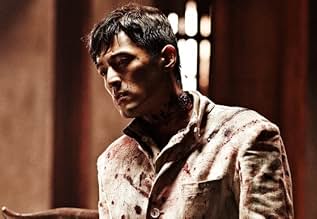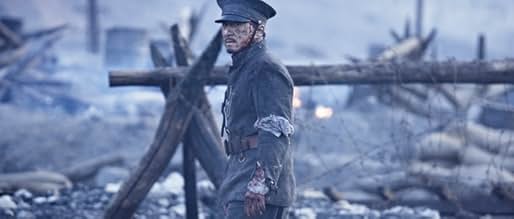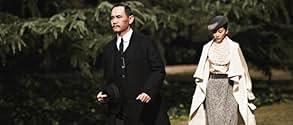AVALIAÇÃO DA IMDb
5,7/10
6,6 mil
SUA AVALIAÇÃO
Um drama histórico baseado na fundação da República da China quando as forças nacionalistas lideradas por Sun Yat-sen derrubaram a Dinastia Qing.Um drama histórico baseado na fundação da República da China quando as forças nacionalistas lideradas por Sun Yat-sen derrubaram a Dinastia Qing.Um drama histórico baseado na fundação da República da China quando as forças nacionalistas lideradas por Sun Yat-sen derrubaram a Dinastia Qing.
- Prêmios
- 6 vitórias e 7 indicações no total
Bingbing Li
- Xu Zonghan
- (as Bingbing Lee)
Jaycee Cho-Ming Chan
- Zhang Zhenwu
- (as Jaycee Chan)
Yu-Hang To
- Xiong Bingkun
- (as Dennis To)
Duobujie
- Feng Guozhang
- (as Duobuji)
Enredo
Você sabia?
- CuriosidadesJackie Chan's one hundredth movie.
- Erros de gravaçãoWhen the revolutionary leader is on the ocean liner heading for China, the lifeboats on deck are too modern: they are painted bright orange and have built-in engines (note the propellers). The movie is set in 1911, so none of these characteristics would be present. Lifeboats of that era were rowboats, usually painted white.
- Citações
Sun Yat-Sen: The goal of revolution isn't death, but to change fate. Young people are sacrificing themselves for the revolution, so that the living can lead better lives.
- Versões alternativasThe original version has a run time of 121 minutes. The more common release is only 99 minutes long
Avaliação em destaque
Being billed as Jackie Chan's centennial film - well it depends on who's counting since IMDb.com listed it as the number 109, but seriously, who's counting? - it was a shrewd career choice to have made it an epic in both scale and story, an extremely well made piece of historical drama filled with political intrigue and a fine cast fleshing out their period roles, and to coincide it with the centennial year of the historical milestone it is based on as well, being the 1911 Xinhai Revolution that ultimately overthrew the Chinese Qing dynasty and ended more than 2000 years of Imperial rule in China. It could have been Rush Hour 4 or Police Story 6, but Jackie Chan had got grander ideas, so good for him.
With the aforementioned centennial celebrations of sorts, there are countless of films being released based on historical characters and incidents in the run up, with big budgeted, and undoubtedly easily labelled as propaganda films like The Founding of a Republic and its sequel The Founding of a Party boasting big name stars in its line up to draw record audiences. The latest yet to hit the big screen here, but soon enough unless the incessant playing of the trailers start to put people off, would be the story of Qiu Jin who was an anti- Qing revolutionary, in a film titled The Woman Knight of Mirror Lake directed by Herman Yau, and it is Qiu Jin who interesting enough, actually opens this film, which may make those unfamiliar with her character scratch their heads for a little while.
In a gist 1911 chronicles the fight by the Tong Meng Hui led by Sun Yat-Sen (Winston Chao) and his band of brothers to start a revolution against the corrupt Qing government who have so far been making plenty of concessions to foreign powers since the Opium War, with the country decaying morally and economically, the poor leading really miserable lives. If you're been watching Chinese cinema set around the era, you'd be fairly familiar with the strife and struggles of the Chinese people in and around that period, and this film centers itself around the failed attempts, and successful forays in leading an armed and bloody revolution to eject the corrupt leaders from their throne of power in Beijing.
Sharing director duties with Zhang Li, Jackie Chan despite being his 100th film which you may think the limelight should fall on him, somehow successfully dissolves into his General Huang Xing role, and didn't mind playing second fiddle to both Winston Chao's Sun Yat-sen and the life-changing events that unfolded in 1911. In many scenes you'll forget about Chan being Chan in his charismatic presence, even toning down his usual repertoire of stunts and moves that he's so well known for in his films, to ground himself very much in reality given it's an historical epic, providing only a glimpse of his old self in just a single scene no doubt to trademark this as a Jackie Chan flick. It's an admirable effort of restraint here, and once again allows Chan to showcase his serious side and acting chops since his successful Little Big Soldier.
The narrative also unfolded fairly evenly, with the first third of it unfolding in an interesting use of time and space rather than what you would think would be the usual chronological unravelling of events. I guess it goes to show the coming of age and maturing of contemporary Chinese mainstream cinema in adopting more creative techniques to their art and craft, and this dedication to accuracy and details show. With classy visual effects and beautiful art direction, the entire film became like a walk through time and history, with stuff you read about in the history books being brought alive. The film tried to cover as much ground as possible, and realistically read like a fast-forwarded synopsis of given key milestones being played out on screen, and the rest breezed through in the use of many inter-titles to fill in the gaps between scenes, which you may need a magnifying glass to read.
And where would the fun be if not for its ensemble cast, some inevitably only get limited air time, such as Ye Shao Qun, Jaycee Chan and Dennis To in very blink and you miss moments. Sun Chun playing Yuan Shikai almost steals the show with his portrayal as the power-hungry general who is biding his time with his allegiance, holding the Qing court ransom with his demands, and stalling his actions for the rebels, providing that level of political intrigue as a shaky alliance based on promises and the integrity of men come into play. Joan Chen also excelled in her role as the Empress Dowager (to think that many years back she was the Queen in Bernardo Bertolucci's The Last Emperor) and was a delight to watch how ineffective the entire dynasty rule had become behind the closed doors of the Forbidden City, while the other female actress in Li Bingbing as the wife of Huang Xing came off as far too lightweight in her nursing role. Winson Chao continues in his typecast role as Sun Yat-sen, portraying him in umpteenth film projects, though at no point you'll doubt his charismatic air and gravitas brought into the role.
1911 challenges Chinese filmmakers to dig deep into their history to tell stories based on its own contemporary, formative years. Even Singapore is finally getting into the act with its own 1965 film project, and I suppose any film industry worth its grain in salt would have these films lined up under its filmography that allows for a critical and artistic look at troubled times before, the ideals held then, and the struggles many took to bring us to where we are today. It may not be Jackie Chan's flashiest role or film, but definitely one of his classiest and dignified one yet. Highly recommended!
With the aforementioned centennial celebrations of sorts, there are countless of films being released based on historical characters and incidents in the run up, with big budgeted, and undoubtedly easily labelled as propaganda films like The Founding of a Republic and its sequel The Founding of a Party boasting big name stars in its line up to draw record audiences. The latest yet to hit the big screen here, but soon enough unless the incessant playing of the trailers start to put people off, would be the story of Qiu Jin who was an anti- Qing revolutionary, in a film titled The Woman Knight of Mirror Lake directed by Herman Yau, and it is Qiu Jin who interesting enough, actually opens this film, which may make those unfamiliar with her character scratch their heads for a little while.
In a gist 1911 chronicles the fight by the Tong Meng Hui led by Sun Yat-Sen (Winston Chao) and his band of brothers to start a revolution against the corrupt Qing government who have so far been making plenty of concessions to foreign powers since the Opium War, with the country decaying morally and economically, the poor leading really miserable lives. If you're been watching Chinese cinema set around the era, you'd be fairly familiar with the strife and struggles of the Chinese people in and around that period, and this film centers itself around the failed attempts, and successful forays in leading an armed and bloody revolution to eject the corrupt leaders from their throne of power in Beijing.
Sharing director duties with Zhang Li, Jackie Chan despite being his 100th film which you may think the limelight should fall on him, somehow successfully dissolves into his General Huang Xing role, and didn't mind playing second fiddle to both Winston Chao's Sun Yat-sen and the life-changing events that unfolded in 1911. In many scenes you'll forget about Chan being Chan in his charismatic presence, even toning down his usual repertoire of stunts and moves that he's so well known for in his films, to ground himself very much in reality given it's an historical epic, providing only a glimpse of his old self in just a single scene no doubt to trademark this as a Jackie Chan flick. It's an admirable effort of restraint here, and once again allows Chan to showcase his serious side and acting chops since his successful Little Big Soldier.
The narrative also unfolded fairly evenly, with the first third of it unfolding in an interesting use of time and space rather than what you would think would be the usual chronological unravelling of events. I guess it goes to show the coming of age and maturing of contemporary Chinese mainstream cinema in adopting more creative techniques to their art and craft, and this dedication to accuracy and details show. With classy visual effects and beautiful art direction, the entire film became like a walk through time and history, with stuff you read about in the history books being brought alive. The film tried to cover as much ground as possible, and realistically read like a fast-forwarded synopsis of given key milestones being played out on screen, and the rest breezed through in the use of many inter-titles to fill in the gaps between scenes, which you may need a magnifying glass to read.
And where would the fun be if not for its ensemble cast, some inevitably only get limited air time, such as Ye Shao Qun, Jaycee Chan and Dennis To in very blink and you miss moments. Sun Chun playing Yuan Shikai almost steals the show with his portrayal as the power-hungry general who is biding his time with his allegiance, holding the Qing court ransom with his demands, and stalling his actions for the rebels, providing that level of political intrigue as a shaky alliance based on promises and the integrity of men come into play. Joan Chen also excelled in her role as the Empress Dowager (to think that many years back she was the Queen in Bernardo Bertolucci's The Last Emperor) and was a delight to watch how ineffective the entire dynasty rule had become behind the closed doors of the Forbidden City, while the other female actress in Li Bingbing as the wife of Huang Xing came off as far too lightweight in her nursing role. Winson Chao continues in his typecast role as Sun Yat-sen, portraying him in umpteenth film projects, though at no point you'll doubt his charismatic air and gravitas brought into the role.
1911 challenges Chinese filmmakers to dig deep into their history to tell stories based on its own contemporary, formative years. Even Singapore is finally getting into the act with its own 1965 film project, and I suppose any film industry worth its grain in salt would have these films lined up under its filmography that allows for a critical and artistic look at troubled times before, the ideals held then, and the struggles many took to bring us to where we are today. It may not be Jackie Chan's flashiest role or film, but definitely one of his classiest and dignified one yet. Highly recommended!
- DICK STEEL
- 27 de set. de 2011
- Link permanente
Principais escolhas
Faça login para avaliar e ver a lista de recomendações personalizadas
- How long is 1911?Fornecido pela Alexa
Detalhes
- Data de lançamento
- Países de origem
- Central de atendimento oficial
- Idiomas
- Também conhecido como
- 1911
- Empresas de produção
- Consulte mais créditos da empresa na IMDbPro
Bilheteria
- Orçamento
- US$ 18.000.000 (estimativa)
- Faturamento bruto nos EUA e Canadá
- US$ 135.739
- Fim de semana de estreia nos EUA e Canadá
- US$ 55.850
- 9 de out. de 2011
- Faturamento bruto mundial
- US$ 3.807.134
- Tempo de duração1 hora 39 minutos
- Cor
- Mixagem de som
- Proporção
- 2.35 : 1
Contribua para esta página
Sugerir uma alteração ou adicionar conteúdo ausente



